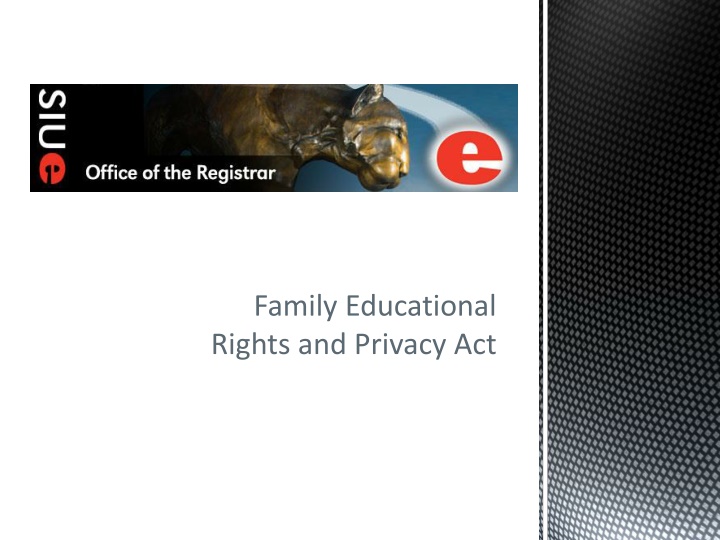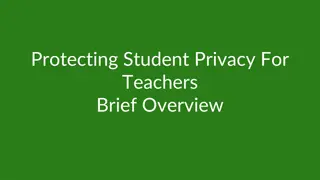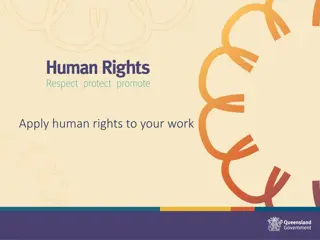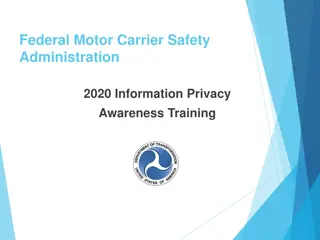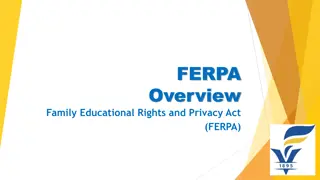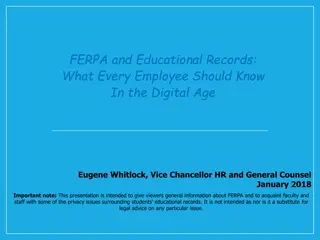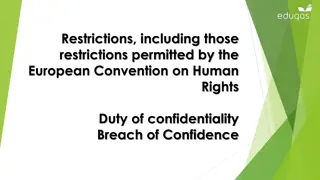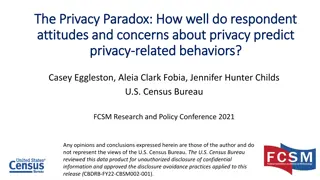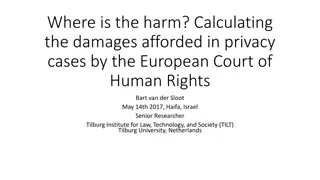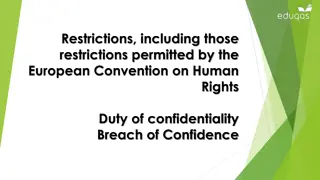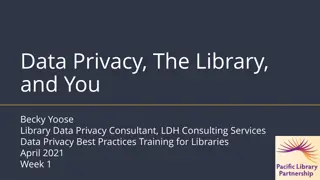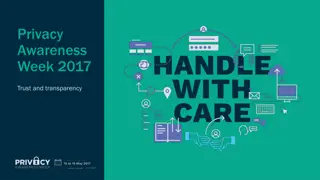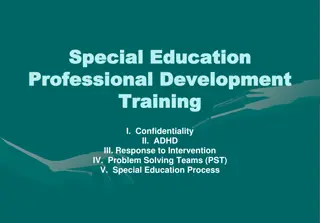Family Educational Rights and Privacy Act
FERPA, or the Family Educational Rights and Privacy Act, protects students' educational records and rights. Students have the right to inspect, seek amendments, control disclosure, and file complaints regarding their records. Universities must inform students of their rights, restrict access to records, and ensure compliance with FERPA regulations.
Download Presentation

Please find below an Image/Link to download the presentation.
The content on the website is provided AS IS for your information and personal use only. It may not be sold, licensed, or shared on other websites without obtaining consent from the author.If you encounter any issues during the download, it is possible that the publisher has removed the file from their server.
You are allowed to download the files provided on this website for personal or commercial use, subject to the condition that they are used lawfully. All files are the property of their respective owners.
The content on the website is provided AS IS for your information and personal use only. It may not be sold, licensed, or shared on other websites without obtaining consent from the author.
E N D
Presentation Transcript
Family Educational Rights and Privacy Act
FERPA The Family Educational Rights & Privacy Act (FERPA) is a federal law that was enacted to protect the rights of students related to their educational records and access to these records that are maintained by educational institution or educational agency. Enacted by United States Congress in 1974. FERPA obligations apply to those covered educational agencies or institution to which funds are made available under any program administered by the Secretary of Education.
When do FERPA rights begin? As soon as a student registers at SIUE FERPA rights begin. Applicants to the University do not have rights under FERPA, however Admission files are included in the educational record once the student enrolls and therefore protected under FERPA. When do the student s FERPA rights expire? Students SIUE educational records are protected through FERPA until death. The University continues to use discretion when releasing information after a student s death. Information would generally only be released to a family member following receipt of a copy of the death certificate.
Student Rights Student applies to all students at a postsecondary institution regardless of age. Student includes anyone in attendance including but not limited to continuing education, auditing, distance/online learner and former students. FERPA grants students the Right to Inspect and review education records, but not necessarily obtain copies. Seek to amend inaccurate or misleading information in education records. Have some control of disclosure of information from education records. File a complaint with Department of Education concerning an alleged failure by the educational institution to comply with FERPA. Please note - Students may request amendment if factual information contained within the record is believed to be inaccurate, misleading or otherwise in violation of the privacy rights of a student. However, FERPA is not an avenue to challenge evaluative decisions regarding a student s performance.
University Responsibilities Notify students annually of their rights. Email notification Alestle ad Registrar s Website Restrict access to educational records. Refrain from disclosure without appropriate authorization. Provide students the opportunity to review educational records within a reasonable period of time (does not have to be immediate within 45 days of the original request per FERPA legislation). The following records are exception: Information about other students Parents financial information Confidential Letters of Recommendation if the student waived their right of access Facilitate the correction of inaccurate or misleading information contained within the educational record. Ensure that all school officials comply with FERPA.
Test your FERPA Knowledge Q - FERPA rights cease after a student has graduated from SIUE? - True - False False - Former students have FERPA rights just as current students do. FERPA protections last literally for life. Q - A student has the right to inspect information in his or her file in the Registrar s Office and in their major department. Which of the following can students review under FERPA? -A. Only Parental Financial Information -B. Only Educational Records -C. Information about other Students -D. All of the above B. Only Educational Records. Students have a right to inspect and review their education records within 45 days of the original request. This includes the right to a copy of the record if being physically present to review is distance-prohibitive. Alternative methods of inspection without releasing a copy to the student are permitted. Students MAY NOT review (a) parent s financial records, (b) confidential letters of recommendation to which the student has waived his/her right, (c) records containing information about more than one student.
Educational Record All educational records that pertain to a student: Directly related to the student. Maintained by the University or by any party acting for the University with some exceptions. The following are not considered educational records: Personal records of instructors, supervisors or administrators that are not revealed to other individuals, or sole possession records. SIUE Police records Alumni records or post-attendance records Records of a physician, psychologist or similar professional (medical records) Employment records held by the University unless the employment is contingent on the employee s status as a student.
Access without consent may be granted To school officials with legitimateeducational interests. A legitimate educational interest exists when review of the record is necessary in order for the school official to fulfill his/her professional responsibilities. Records should be used only in context of official business in conjunction with your job duties. School officials are expected to refrain from accessing information that is not necessary to fulfill work-related responsibilities. School officials may not disclose information contained within students educational records without the written authorization of the student. To officials of another school at which a student seeks or intends to enroll. To authorized representative for audit, evaluation, or enforcement of federal and state supported programs. To accrediting organizations carrying out their accrediting functions.
Access without consent may be granted (Continued) To Companies with whom the University has contracted. To appropriate parties in a health or safety emergency. Must document what the emergency was and to whom the information was released. To comply with a judicial order or lawfully issued subpoena. Release of information through subpoena or judicial order is coordinated through the Office of the Registrar Records Manager in consultation with Legal Counsel. When a record is subpoenaed, the University is obligated to make a reasonable attempt to notify the student prior to release unless the court orders non-disclosure in a grand jury or law enforcement subpoena. Except where specifically prohibited, the University must make a reasonable attempt to notify the student in advance of release of information. To comply with health or safety emergency to appropriate parties in connection with an emergency if knowledge of the information is necessary to protect the health or safety of the student or other individuals.
Parental Access When a student reaches the age of 18 or begins attending a postsecondary institution regardless of age, FERPA rights transfer to the student. Therefore, all SIUE students must give written authorization for parental access to education records. Authorization to Release Information form is available in the Service Center and online at siue.edu/bursar. The University MAY disclose information to parents without the student s consent as follows: Parents of a student who have established that student s status as a dependent. Parents of a student under the age of 21 regarding a violation of any law, at any level, or institutional policy or rule governing the use of alcohol or a controlled substance.
Third Party Access When a student submits a Authorization to Release Information form, a student attribute (3RD) is added in Banner (SGASADD). While students may authorize third parties to access information about their record, the University is only obligated to share information with the student.
Test your FERPA Knowledge Q - Who has a legitimate educational interest? A Instructors B Advisors C - Members of appeals committees D All of the above D All of the above. Q - Since I have access to Banner, I am authorized to access any student s record for any reason. Yes, I am authorized to access any student s record No, Records should only be used in context of official business in conjunction to my job duties. No, Records should only be used in context of official business in conjunction to my job duties. Access to a system, like Banner or CougarNet, does NOT authorize unrestricted access to students data. Records should be used only in the context of official business in conjunction with your job duties. Curiosity does not qualify as a legal right to know.
Directory Information Directory information is information within a student s education record that would not generally be considered harmful or an invasion of privacy if disclosed. It also may be released without a student s written consent UNLESS the student has requested it be withheld. In SIUE s student information system, these student s records are identified as Confidential . Directory Information is identified as general information and may be made available to the public or serve as a source of information for students when contacting or forming study groups, contacting friends, etc. While the information is not intended for commercial use, it is possible that the information could be used for this purpose. SIUE does publish a directory containing student contact information. This directory is available in printed form and on our website. Future enhancements may put the directory in SIUE Student portal to allow for further protection to SIUE students.
More on Directory Information SIUE s Policy on Release of Student Information and Access to Student Records 3G2. Student Name Date of birth Student Addresses and telephone numbers (local, permanent, home) Student e-mail address Major field of study Classification Dates of attendance Full or part-time status Attempted hours Degrees and awards received Most recent educational agency or institution attended prior to enrollment at SIUE Participation in recognized activities or sports Athletes Only - Weight and height
Withholding Information Students may request that directory information be withheld by submitting a written request. When students request that information be withheld, it will not be released without individual written authorization. Directory Information Release form foundonline at siue.edu/registrar. The request will remain in effect until the student formally releases the hold. Students who have requested that directory information be withheld will have Confidential flagged on their record in Banner (SPAIDEN/Biographical tab). Students with this indictor will not appear on the Student Directory website and withheld from reports like graduation listings in local newspapers and Dean s Listing. Note - Office of the Registrar can manually insert students who wants to remain confidential but listed in graduation listings or Dean s Listing. The student would need to reach out to the Registrar s Office Records Department for this manual adjustment.
Test your FERPA Knowledge Q -You receive a call from the parent of a registered student who has invoked the Privacy Act/Confidential. The parent wants to know if the student is registered for the current semester. Is it acceptable to inform the parent that directory information cannot be released on the student because they have invoked the Privacy Act? Yes No No Since the student invoked the Privacy Act, the correct response is: We have no information to release on that individual - please contact the individual directly. Q - You receive a call from a recruiting firm asking for names and addresses of students with a grade point average of 3.0 or better. They say they have job opportunity information for these students. Can you help these students get jobs by giving out this information? Yes No No You may not give out student information that pertains to GPA to any external party without prior written consent of that student. Even if the specific GPA is not provided to the firm, you would be indicating that the students in that population have at least a 3.0 GPA, which is non-directory information protected under FERPA.
Test your FERPA Knowledge Q An academic department is preparing a mailing to departmental students about a critical academic deadline. Should the mailing list include the name and address of a student who has invoked the Privacy Act (filed an objection to the release of Directory Information Form)? Yes No Yes - The student's name and address may be used for this mailing. Information for students who have invoked the Privacy Act may be used by SIUE officials to meet the direct educational needs of the student. Q You leave your desk for lunch. While you are gone a student uses your computer to access another student's information. Are you and SIUE responsible for this violation under FERPA? Yes No Yes - Information on a computer screen must be protected in the same way paper documents are protected. You should log off Banner when you leave your work area.
Learn more about FERPA American Association of Collegiate Registrars and Admissions Officers (AACRAO) - https://www.aacrao.org/resources/ferpa The U.S. Department of Education - https://www2.ed.gov/policy/gen/guid/fpco/ferpa/index.html Video: Student Privacy 101 FERPA for Parents and Students - https://youtu.be/nhlDkS8hvMU
